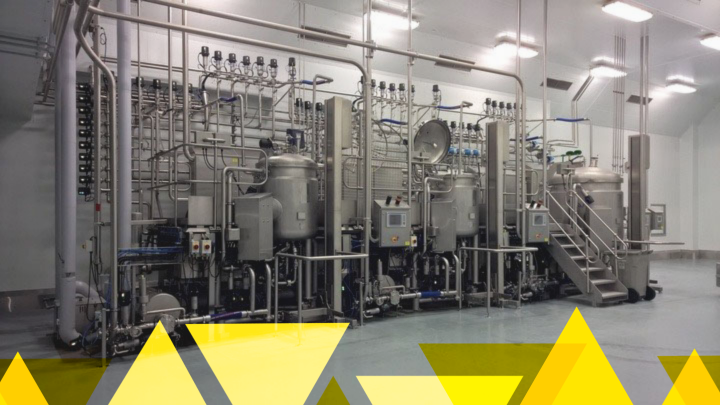We previously looked at the rise of the ready meal and the role technology played in that story. Now we’re shining the spotlight on food processing equipment manufacturer, BCH Ltd. Read on to understand how critical innovation and automation is in food manufacturing.
Overview:
- Importance of innovation & automation in food manufacturing
- Examples of automation & digitalisation in food manufacturing
- Advantages of automation in food industry (with examples)
- Automated food processing equipment by BCH
Importance of innovation & automation in food manufacturing
For food manufacturers, automation is not just technology for technology’s sake. Automation in food manufacturing is fundamental to a healthy bottom line. Technology innovation can lead to improvements in quality, food safety, traceability, production downtime, energy and water efficiency. These can all translate to improved profits.
Let’s look at an example.
The food processing industry, like many other industries right now, is experiencing rising energy costs. It is therefore of paramount importance that equipment and processes are as energy efficient as possible.
Stuart Grogan, Operations Director at BCH, was recently interviewed by International Confectionary. He explained how the company’s commitment to innovation is helping to solve these sorts of issues for customers.
Their dedicated Innovation Centre in Rochdale, England allows BCH to “partner” with customers to test and develop new products, as well as refine existing processes. This is useful because, as he points out, “Sometimes, considering upgrading the highest energy consuming processes can be more practical if the capital investment/pay-back justification can be observed [as opposed to theorized].”
But that’s not the only way to test and improve the efficiency of a production line. “Regular maintenance,” says Grogan, “and even changing out some equipment to more energy efficient motors can all make small contributions to less energy consumption.”
Learn more: Importance of Spare Parts in the Food Processing Industry
Examples of automation & digitalisation in food manufacturing
An interesting example of automation and digitalisation in food manufacturing is the control systems integrated with BCH equipment. These systems are capable of highlighting when a particular process is not at its most efficient and alerting the appropriate department. This allows problems to be identified and fixed quickly.
This is just one was that BCH is using automation to improve production line efficiency and minimise downtime.
“BCH have been supplying equipment with software solutions from when they were first introduced. However, as technology advances, we are constantly challenging ourselves to make our systems the most interactive, user-friendly and intuitive to the user. This contributes to using the least amount of labour required to operate the line and ensure consistent, repeatable and high-quality products.”
In a time of labour shortages, automation is easing the pressure on manufacturers. Plus, with high consumer demand for traceability and quality, the more reliable and repeatable the process, the better.
Not only can BCH equipment software facilitate day-to-day operations, it allows for remote access and interrogation. This means equipment can be installed and operators trained anywhere in the world from BCH’s UK Headquarters.
Advantages of automation in food industry (with examples)
It’s not only BCH investing in automation capabilities and digitalisation to improve equipment for food processors. Many other manufacturers are doing it too. These are the brands that FPE is proud to supply because of the advantages they bring to food industry clients:
- Improved operational efficiency
- Less waste water/energy/cleaning chemicals, e.g. hygienic entrances
- Less manual labour required: desirable during labour shortage
- More consistency of product & less room for human error
- Improved food safety, e.g. automated cook-chill systems and HACCP compliance software
- Accelerated manual processes, e.g. automatic tempering machines and automatic industrial can openers
- Improved operator health & safety, e.g. mechanical handling equipment and industrial meat cutting machines
Automated food processing equipment by BCH
So, we know how important innovation and automation in food manufacturing is to BCH. Let’s look at how that translates into their most popular equipment, which is all available from FPE.
Industrial cooking equipment
Whether you need atmospheric cooking kettles, pressure cookers with direct steam injection, vacuum cookers or bratt pans, FPE can help. We are proud suppliers of BCH industrial cooking equipment in Australia and New Zealand.
Industrial blenders
If you need to blend smooth sauces, dips or emulsions, the versatile BCH Optima (an industrial blender) gives you precision control. It’s ideal for creating everything from sauces to fruit fillings, pates and confectionery.
Vacuum chilling systems
BCH’s innovative vacuum food chillers are ideal for the rapid cooling of sauces, soups and casseroles. For pouch filling and cooling, the BCH RotaChill machine is a great option. Their range of cooling equipment ensures that nutrients are locked into the food immediately after cooking. This gives customers a high level of quality as well as food safety.
Food extrusion & forming equipment
BCH are recognised world-leaders in the supply of food extrusion and forming equipment for the confectionery industry. Suitable for the production of candy and liquorice, these systems are also ideal for 100% extruded fruit (with no added sugar).
All of these systems are specially designed to boost productivity, streamline your processes, and improve overall quality. If you would like to find out more about automation in food manufacturing or any of the equipment mentioned in this blog post, don’t hesitate to contact FPE today. Call our friendly team on AUS 1800 882 549 or NZ 0800 100 003.






